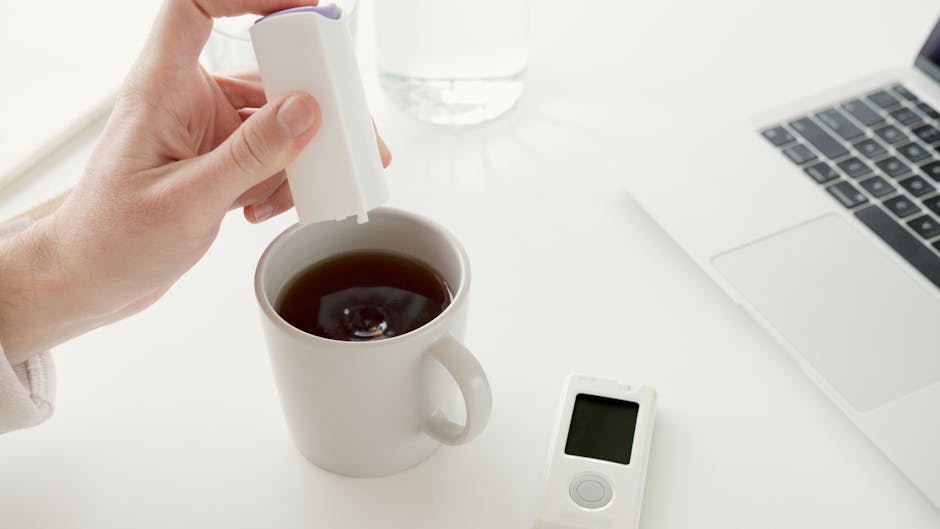
– Coffee's one of the most
consumed beverages in the world. Some people drink it daily. Some people drink it five times a day. Today, we're going to be talking about all the effects
that it has on your body that you would not expect. (indistinct) I'm a little coffee-hyped. Most people associate
coffee with the sudden urge to go to the bathroom. And that is true for some people. The reality is that coffee affects our
GI systems differently. And for some, it could
actually cause constipation as opposed to diarrhea. And we're quick to blame
caffeine for the surge to go. But the reality is we
have research showing that decaf coffee has similar effects, leading us to believe that
it's actually the result of the secretion of the
hormone named gastrin, which actually promotes digestion.
(slurping sound) Coffee could absolutely
wreck your ability to sleep. Throughout the day, your body produces more
and more adenosine, which actually binds to receptors generating a sleepy
response from your body. The longer that you're
awake, the more adenosine, the more binding, the sleepier you are. Now coffee comes in with
its caffeine content and starts blocking those
adenosine receptors, thereby making you feel less sleepy, thereby making it harder to fall asleep. So its intended effect can actually become a negative effect. The caffeine can actually also
impact our circadian rhythm through its effects on melatonin, which can confuse our internal clock. It's almost like having a form of jet lag without any of the fun of travel. (slurping sound) I'll have a large coffee with a double shot of anxiety, please. You can add all sorts of
tasty things to your coffee, like cream, sugar, or any of this. Of course, unless you're drinking decaf, your coffee is also loaded with caffeine. And while caffeine can be
useful in waking you up and keeping you stimulated, it can also cause a
jittery sensation nearby, causing you to be anxious or sweaty even.
That's because it activates
the fight or flight response in the body known as the
sympathetic nervous system. Research has even shown
that overdoing caffeine by a small amount can
increase baseline anxiety and the likelihood of panic attacks. (slurping sound) Coffee can absolutely impact your weight, as black coffee is nearly calorie-free and actually kicks up your metabolic rate. And in fact, as caffeine
stimulates the production of adrenaline, it also
decreases the level of ghrelin, the hormone that makes you feel hungry and your stomach growl. Grehlin, growl. But this effect holds true even for decaf, because it has been shown
to increase the hormone peptide YY, which actually
makes you feel satiated or full. And for intermittent
fasting fans like myself, research has shown that
having a black cup of coffee does not break your intermittent fast and actually keeps the majority of intermittent fasting benefits there. This means that black
coffee can truly be used to aid in your weight loss efforts. Cheat code vibes. (slurping sound) Coffee makes your hands feel cold because coffee stimulates
those small glands that sit on top of your
kidneys called the adrenals.
They secrete adrenaline and a stress hormone known as cortisol. One of the main effects of adrenaline is to constrict blood
vessels which are not of utmost importance to your survival. That means all the small
blood vessels furthest away from the midline of your
body, like in your fingertips and your toes, they start
getting vasoconstricted. They start getting tighter, which temporarily decreases
some of the circulation to your hand, making them
feel cold and look pale. (slurping sound) Caffeine is one of the most studied performance enhancing drugs. PEDs? Yeah. Why? Because it works and has been shown to have significant benefits as long as you don't overuse it.
Focus, endurance, strength, speed have all been tested and
found to have been boosted with low to moderate doses of caffeine 60 to 90 minutes before
workouts and competitions. That this effect is so great, that the NCAA has actually
set a caffeine limit for its athletes. They restrict the amount of
caffeine in an athlete's system by limiting concentrations
to roughly 500 milligrams of caffeine or several cups of coffee. (slurping sound) It's no surprise that coffee
does raise the heart rate and blood pressure temporarily due to the secretion of
epinephrine, adrenaline.
The interesting part is that
the effect has been found to be true for decaf coffee as well. So another ingredient could
potentially be responsible here. It's also important to note
that long-term consumption does not seem to cause hypertension. The thinking is that those who
consistently consume coffee actually build up a
protective tolerance to it. Will say, though, that I
have treated individuals who have gotten their blood
pressure under better control by removing caffeine
from their diet entirely. Just saying. (slurping sound) Removing coffee's a double-edged sword 'cause it could cause withdrawal symptoms as early as 12 to 24 hours.

The thought behind caffeine
withdrawal headaches is that the blood vessels in the brain, which normally are kept
tight and constricted due to the action of the caffeine, start to swell and cause pain. The ironic part of this is that caffeine is actually
found in some common over-the-counter medications
like Excedrin Migraine. (slurping sound) Is coffee dehydrating? This one is fiercely
argued on online forums. Some say yes, some say no. Here's the truth. Coffee is a mild diuretic. It makes you pee more. It makes you excrete more fluids. However, if you're drinking
a full cup of coffee, there's fluids in there, so it replaces the fluids you lose, right? Yes. However, if you're
drinking little espressos or espresso shots in your coffee, and you're getting a ton
of caffeine in there, you're not replacing the loss fluid, and then in that case, it
can be somewhat dehydrated. That being said, if
you're not overdoing it, it's usually not enough
to become a problem.
(slurping sound) My dear acid reflux sufferers, coffee can absolutely
impact your acid secretion. First of all, we need to stop with this acid base obsession
that has developed online. Drinking electrolyte reduced water, alkaline water is just complete nonsense. The reason coffee makes acid reflux worse is much simpler than that. It is proven to stimulate gastrin release, which increases gastric acid secretion. And this happens because of
the bitter taste of coffee that activates a type two bitter taste receptors in your mouth.
So the bitter taste of coffee makes your body secrete more acid. (explosion) (slurping sound) Coffee actually messes
with your medications and it interacts with
them in one of three ways. First, it affects the absorption of the medications and
studies have actually shown that common over-the-counter
meds like ketoprofen, which is very similar to
ibuprofen and paracetamol, which is similar to Tylenol, are significantly
impacted by coffee intake. The second is through the
disruption of the metabolism of the medications through enzymes. For example, the blood
levels of clozapine, lithium, warfarin, and several antidepressant drugs actually were increased after
the ingestion of coffee, making them more potent and
potentially increasing toxicity.
And the third, is through
the disruption of excretion of the drugs. Basically, how long they stick around. In fact, we've seen increased
excretion of minerals like, calcium, magnesium,
sodium, chloride, and even water-soluble
vitamins like vitamin B. Think about that. You're drinking coffee,
you're taking your meds, and it's all going amuck. Coffee makes you pee. Here's the truth about holding your pee. Check this out now. It's a must-watch. As always, stay happy and
healthy, but watch this. There's a ton of great
comments and questions in here.
Whoa. (upbeat music).







